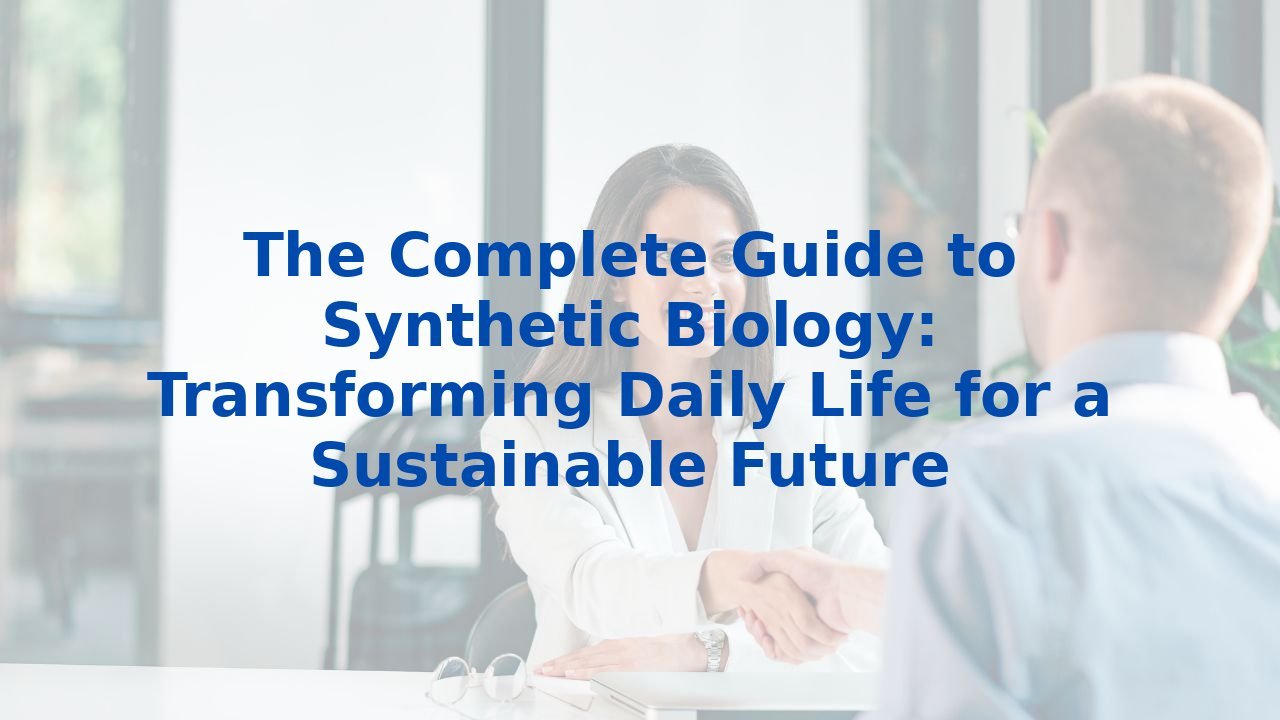The Complete Guide to Synthetic Biology: Transforming Daily Life for a Sustainable Future
The Complete Guide to Synthetic Biology: Transforming Daily Life for a Sustainable Future
Introduction
Synthetic biology is not just an emerging field—it's a revolution, reshaping industries and our everyday lives. By interweaving biology and engineering, synthetic biology allows us to design, build, and modify biological systems with clarity and purpose. In a world wrestling with unsustainable practices, the potential of synthetic biology shines bright, extending its influence across healthcare, agriculture, energy, and environmental conservation. This guide will navigate the intricacies of synthetic biology and illustrate how the integration of AI can fine-tune these innovations, driving efficiency within businesses and guiding us toward a sustainable future.
What is Synthetic Biology?
At its core, synthetic biology represents a fusion of creative engineering and biological science. By creating new biological parts and re-engineering existing systems, scientists can address pressing challenges. This results in solutions that range from engineered organisms capable of producing biofuels to gene therapies that provide hope for once-incurable diseases.
Applications of Synthetic Biology
1. Healthcare: Synthetic biology can yield groundbreaking therapies. Innovations, such as bio-engineered enzymes or designed vaccines, are already changing the landscape of medicine.
2. Agriculture: Enhanced crop varieties resistant to pests and environmental stressors pave the way for higher yields and food security without harming the ecosystem.
3. Energy: From biofuels synthesized from microorganisms to new energy sources, synthetic biology offers pathways to a cleaner, more sustainable energy landscape.
4. Environment: By developing microorganisms that degrade pollutants, synthetic biology can help restore ecological balance and combat pollution.
5. Materials and Manufacturing: Synthetic organisms can create biodegradable plastics, revolutionizing manufacturing while reducing our reliance on fossil fuels.
Benefits of Synthetic Biology
The economic impact of synthetic biology is staggering, projecting yearly revenues in the trillions as the sector grows. Additionally, it fosters sustainability by providing eco-friendly alternatives to traditional manufacturing processes. Perhaps one of the most exciting prospects is the synergy between synthetic biology and AI: rapid innovation fueled by advanced technologies.
Challenges and Risks
Yet, like any groundbreaking innovation, synthetic biology is not without its challenges. The unintended consequences of manipulating biological systems could ripple across ecosystems. Furthermore, ethical considerations, particularly concerning genetic manipulation, demand our attention. Access to these technologies can also create disparities, leaving some populations behind.
How AI Can Enhance Synthetic Biology
AI's role in synthetic biology is transformative. Here’s how:
1. Improving Design Efficiency: Leveraging AI can streamline the design process by rapidly analyzing genetic datasets and predicting outcomes—saving time and resources.
2. Enhancing Testing Cycles: AI enables the automation of testing, allowing organizations to iterate quicker.
3. Personalized Medicine: The combined power of synthetic biology and AI can yield individualized therapies, tailored to a person's unique genetic profile.
4. Environmental Remediation: AI aids in optimizing synthetic organisms designated for environmental clean-up, ensuring they perform effectively in varied conditions.
Benefits of Employee Training for AI
Equipping your workforce with AI knowledge amplifies the impact of synthetic biology. Here’s why training is vital:
1. Improved Data Analysis: Employees trained in AI bolster data analysis skills, which is crucial for predicting genetic modifications and optimizing designs.
2. Enhanced Innovation: A knowledgeable workforce can produce new AI tools and algorithms, pushing the boundaries of what’s possible in synthetic biology.
3. Faster Implementation: With trained employees, AI tools can be integrated into existing workflows without disruption, accelerating the deployment of synthetic biology applications.
Conclusion
Synthetic biology is a catalyst for change, providing sustainable solutions in critical sectors. Its union with AI is a game-changer, enhancing efficiency and pushing innovation to heights previously deemed unattainable. To ensure that these advancements benefit all of society, we must focus on equitable access and ethical considerations. As we embrace the future of synthetic biology, let us strive for solutions that promote sustainability and elevate our planet.



